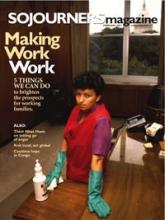On outdoor benches in a poor neighborhood of Kinshasa, the capital of the Democratic Republic of Congo, a small congregation prayed for wisdom as they prepared to vote in their country’s first democratic elections in more than 40 years.
“If we choose a good leader, after five years we will be doing well,” Rev. Fumunguya Muenekuangu preached at Manenga Mennonite Church, a congregation of about 15 adults and many more small children who meet under a tarp in a vacant lot. The earnest, soft-spoken pastor continued: “If we choose wrong, after five years we will be suffering.”
Many Congolese churches shared this sober assessment as their country held long-awaited elections last year. The problems facing Congo, the largest nation in central Africa, are enormous. Exploitive colonial rule, corrupt dictatorship, and war have left its 60 million citizens among the poorest people on earth. Two wars devastated Congo from 1996 to 2003, and lawless armed groups continue to plague the country’s eastern regions, causing an ongoing humanitarian crisis.
In the face of these challenges, Congo is struggling to become a democracy. Last year, the United Nations helped Congo’s transitional government organize presidential and parliamentary elections on July 30 with a presidential runoff on Oct. 29. It is too early to judge the success or stability of Congo’s newly elected government, but widespread public participation in the elections—including the involvement of Congo’s many Christian denominations—was a dramatic and hopeful sign.
About 18 million people, or 70 percent of registered voters, participated in the July 30 elections. In Kinshasa, voters waited in long lines in schools that were converted into voting centers. Mothers left their infants in the arms of poll workers while they voted.
Read the Full Article
